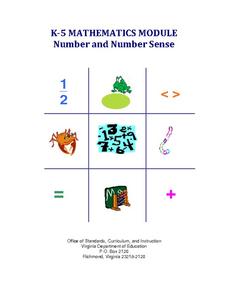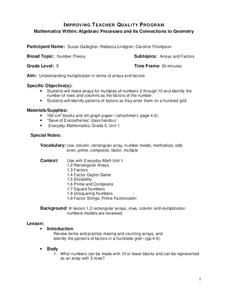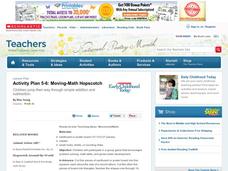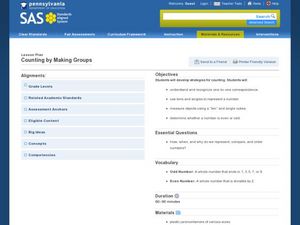Curated OER
Among the Odds and Evens: A Tale of Adventure
Students fformulate the pattern that the sum of two even numbers is even, the sum of two odd numbers is even, and that the sum of and even and odd number is odd.
Alabama Learning Exchange
Musical Patterns
Young scholars explore the concept of patterning using musical instruments. In this music activity, students identify several instruments and practice playing patterns with them. Young scholars identify the patterning in a musical piece.
World Mysteries
Pascal’s Triangle and Sierpinski Triangle
Your learners will enjoy this one-page, color-coded poster containing Pascal's triangle and its connection to Sierpinski's triangle. By coloring odd numbers orange and even numbers green on Pascal's triangle a pattern evolves,...
Curated OER
I Can Use a Worm to Count
Kindergarteners use worms, puppets or other props to practice counting to 100. First, they listen to a read aloud of Count Worms by Roger Hargeaves. A worm pattern is used to count to 100, with each segment of the worm representing a...
Curated OER
In and Out Function
Third graders examine how to solve in and out function problems, or mystery numbers. They analyze a variety of mystery number problems together and extend the patterns. Students then independently complete a Mystery Number activity...
Curated OER
Integers and the Number Line
In this integer and number line worksheet, students in 6 problems name the graphed set of numbers. Students then graph 8 number sets.
Curated OER
K-5 Mathematics Module: Number and Number Sense
Reinforce number sense with a collection of math lessons for kindergarteners through fifth graders. Young mathematicians take part in hands-on activities, learning games, and complete skills-based worksheets to enhance proficiency in...
Curated OER
Fiddle Dee Diddle - It's Time For A Riddle
Energize your math class! They will use the story problem process to solve math riddle problems. They compute and solve problems involving addition and subtraction of 3- and 4- digit numbers and basic facts of multiplication and division...
Curated OER
Dice Games
Games and activities are wonderful for igniting interest in nearly any topic. With a pair of dice, your class will practice their basic math and social skills at the same time. Learners battle it out to see who can roll only odds or only...
Computer Science Unplugged
Card Flip Magic—Error Detection and Correction
I can find the error in an array of cards? After watching a demonstration class members search for the error is the provided cards. The resource provides a real-life example of using ISBN numbers in error detection and using check sums.
Willow Tree
Factoring Polynomials
Young mathematicians discover trees organize more than just families — they help factor, too. The lesson begins with factor trees and develops slowly to factoring by grouping and special patterns.
Smithsonian Institution
Trait Tracker
Help mice beat the odds with an exciting activity about traits. Biologists discover the role of diet and other factors on animal traits by participating in a simulation activity. Teams collect and evaluate data to understand how certain...
Curated OER
Counting Patterns - Count Forward by 3 Up to 100
In this counting pattern learning exercise, 3rd graders count forward by 3 in each number sequence. They fill in 3 tables using the counting by 3 pattern. They start with both odd and even numbers.
Curated OER
Belongs, Doesn't Belong
Fifth graders discover the rule used to sort a set of data into two sets, those data that belong according to the rule and those data that don't belong. Students participate in a game to determine the rule. They discuss strategies for...
Mathematics Vision Project
Geometric Figures
Logical thinking is at the forefront of this jam-packed lesson, with young mathematicians not only investigating geometric concepts but also how they "know what they know". Through each activity and worksheet, learners wrestle with...
Curated OER
Mathematics Within: Algebraic Processes and Its Connections to Geometry
Fifth graders discover the connections between algebra and geometry. With a focus on arrays and factors, they are introduced to multiplication. They develop an array for multiples of 2 through 10 and identify the factors of each row....
Curated OER
Moving-Math Hopscotch
Students engage in a hopscotch game where each square represents a number. In this mental math and movement lesson, students take turns playing traditional hopscotch, but add a mental math component where they add or subtract specific...
Curated OER
Counting by Making Groups
First graders represent, compare, and order numbers. In this counting skills lesson, 1st graders use manipulatives to demonstrate one-to-one correspondence and to represent numbers. This lesson includes a teacher script to guide the lesson.
Curated OER
Skip-Counting
In this skip counting math practice worksheet, students complete 2 charts that are missing numbers. Each chart includes numbers from 1-100. Students also highlight even and odd numbers.
Curated OER
Number Sense Review for Grade 3
In this number sense review for grade 3 worksheet, 3rd graders answer 20 multiple choice questions in standardized test format about third grade math.
Curated OER
Divisibility Rules
In this divisibility rules worksheet, 6th graders read the divisibility rules, then apply these rules to solve 50 problems on 21 pages with answer key provided at the end.
Curated OER
The Language of Mathematics
Students integrate the language, concepts and skills of math into the daily routine and classroom environment. They think mathematically by participating in short, daily, individual, small group, whole group and transitional activities...
Curated OER
Range, Cluster, Gap and Outliers
There are a number of activities here where learners collect and record data, as well as, activities where the likelihood of an event happening is calculated given the experimental probability. Young statisticians organize information...
Curated OER
Inequality and the 1/2 Benchmark
Fourth graders utilize fraction bar manipulatives to compare a variety of fractions to the fraction value 1/2. Pupils are put into groups, and they begin to see how fractions that look completely different actually represent the same...

























